September 8, 2025

The article titled "10 Essential ABA Therapist Requirements for Career Success" highlights the critical qualifications and skills necessary for ABA therapists to excel in their careers. In a rapidly growing field, the demand for Board Certified Behavior Analysts (BCBAs) is significant, underlining the importance of a combination of educational credentials, practical experience, certification, ethical standards, and effective communication skills.
Aspiring BCBAs must recognize that these elements are not merely beneficial but essential for thriving in Applied Behavior Analysis. As the job market expands, the need for qualified professionals becomes increasingly evident, making it imperative for candidates to meet these requirements to succeed.
The landscape for Board Certified Behavior Analysts (BCBAs) is undergoing a remarkable transformation, fueled by a surge in demand for their specialized skills. Job postings for ABA therapists are skyrocketing, and projected growth rates are soaring. In this competitive environment, understanding the essential requirements for success has never been more crucial.
What qualifications and skills distinguish successful ABA therapists? Exploring these ten critical requirements not only illuminates the path to a rewarding career but also equips aspiring professionals to navigate the complexities of this vital discipline.
The demand for Board Certified Behavior Analysts (BCBAs) is soaring, with an anticipated increase of 25% by 2026 and a broader job growth rate of 22% over the next decade. Hire ABA stands at the forefront of this recruitment revolution, providing a specialized platform that connects BCBAs with premier job opportunities in this expanding field. By harnessing advanced algorithms and a user-friendly interface, Hire ABA streamlines the job matching process, empowering qualified professionals to secure positions that align seamlessly with their skills and career aspirations.
Consider the staggering growth in job postings for behavior analysts—an increase of 1,942% from 2010 to 2022, projected to triple to over 103,000 by 2024. In such a competitive landscape, leveraging platforms like Hire ABA is crucial for enhancing visibility and accessibility for job seekers. This platform not only simplifies the recruitment process but also emphasizes the importance of tailored strategies in achieving , as endorsed by industry leaders.
As the ABA landscape continues to evolve, utilizing specialized recruitment services like Hire ABA becomes essential for professionals striving to thrive. Employers, too, are encouraged to leverage Hire ABA to elevate their recruitment efforts and connect with the most qualified candidates available. Are you ready to transform your hiring process and tap into the vast potential of this growing field? Join Hire ABA today and ensure your organization stands out in the competitive market for behavior analysts.

A bachelor's degree in psychology, sociology, education, or a related field is part of the ABA therapist requirements for aspiring professionals. This not only provides candidates with critical insights into human behavior, developmental psychology, and the principles of behavior analysis, but it is also vital for effectively implementing ABA strategies and interventions across various settings, including schools and clinics.
Current trends indicate that 71% of ABA therapists satisfy the ABA therapist requirements by holding a bachelor's degree, underscoring its importance in the profession. As the demand for ABA therapy continues to rise, educational pathways are evolving to better align with ABA therapist requirements by including more specialized training and certification options. This evolution ensures that therapists are well-equipped to meet the diverse needs of their clients.
Real-world examples illustrate that many successful ABA therapists begin their careers with this foundational education, which enhances their understanding of behavioral principles and prepares them for advanced roles in the field.
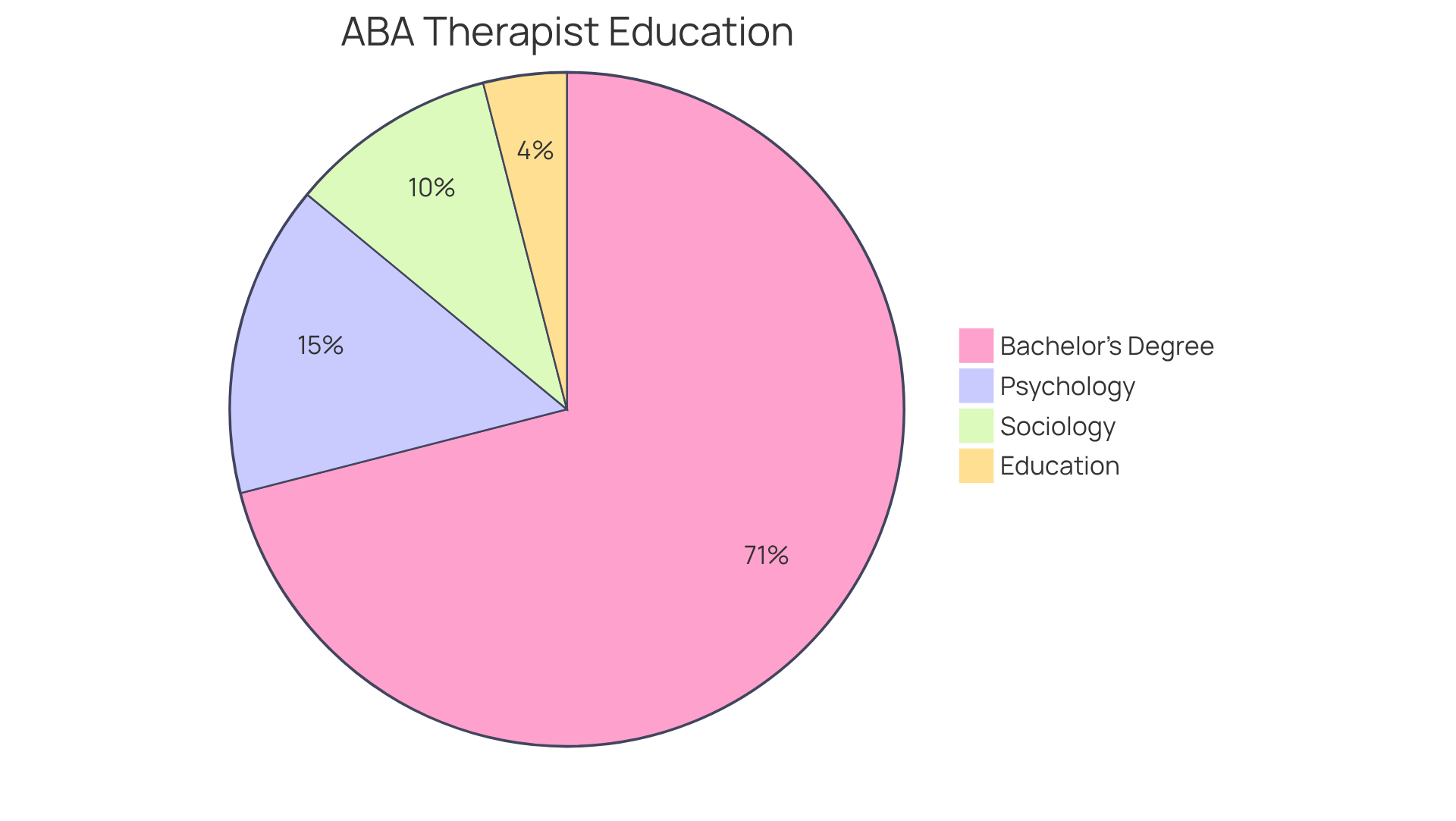
To satisfy the aba therapist requirements and achieve Board Certified Behavior Analyst (BCBA) status, candidates must first obtain a master's degree in behavior analysis or a related discipline, complemented by targeted coursework in behavior analysis. Following the completion of these educational prerequisites, candidates must meet the aba therapist requirements by logging a specified number of supervised experience hours, which is crucial for practical skill development. Finally, candidates must successfully pass the BCBA examination, a critical step that certifies their expertise and meets the aba therapist requirements, significantly enhancing their career prospects in the rapidly evolving field of ABA therapy.
The cannot be overstated; it serves as a key differentiator in a competitive job market, often leading to advanced roles and increased earning potential. For example, certified Behavior Analysts typically experience a more advantageous career path, with many indicating significant professional advancement and prospects for leadership roles after certification. As one BCBA noted, 'The certification process, while challenging, is a vital investment in one's career, paving the way for impactful work in behavior analysis.'
Additionally, it is important to note that the first-time pass rate for BCBA exam takers was 54% in 2024, underscoring the challenges candidates face and the necessity for thorough preparation. On average, candidates can expect to achieve BCBA certification within two to three years, depending on their educational background and the time dedicated to supervised experience. Are you facing challenges in hiring qualified Behavior Analysts? Consider how the right recruitment platform can streamline your process and connect you with top talent in the field.
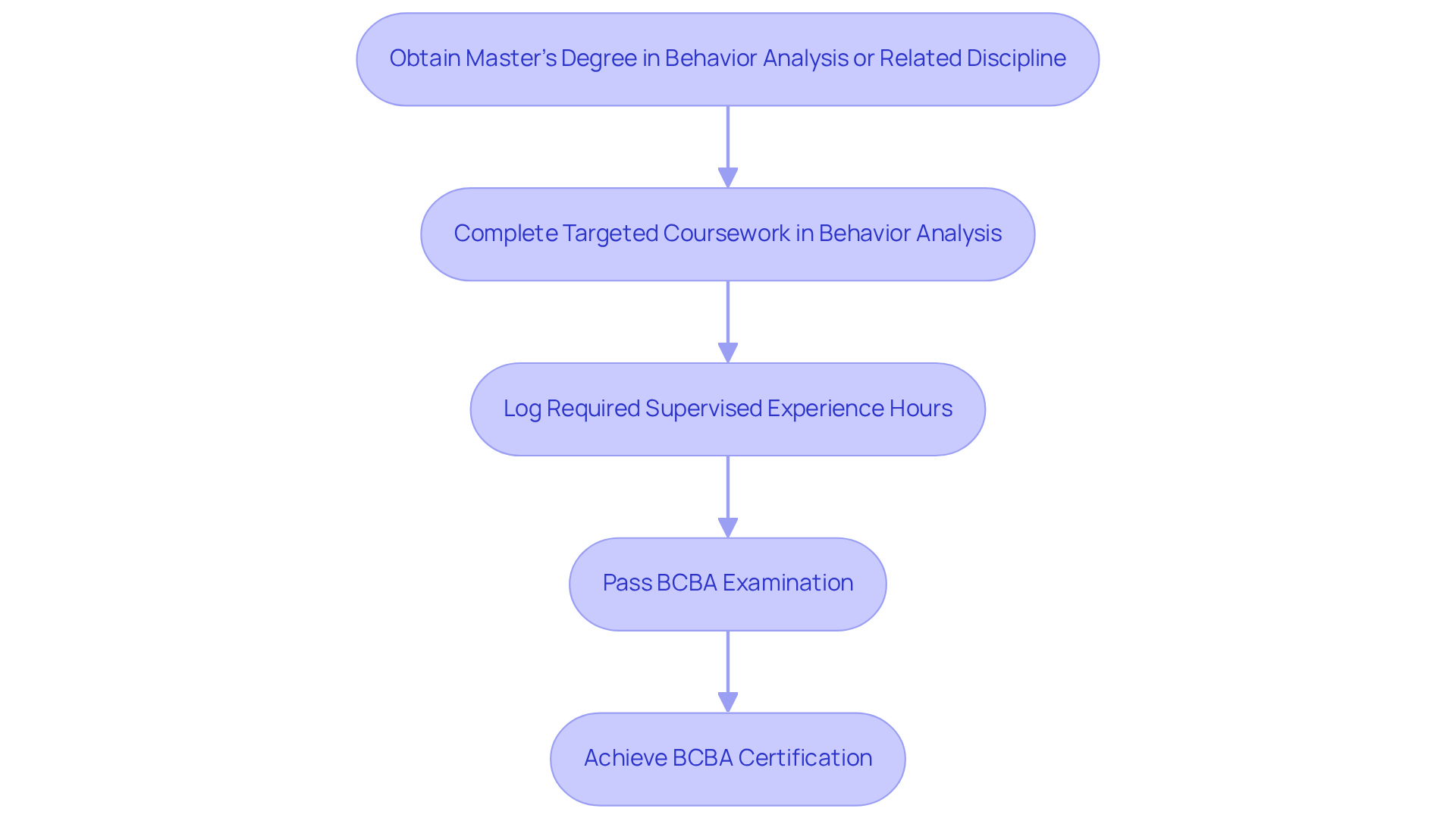
To fulfill the ABA therapist requirements, aspiring BCBAs are required to complete a minimum of under the guidance of a qualified BCBA. This practical training is not just a formality; it is crucial for developing the skills necessary to evaluate individual needs, design effective interventions, and implement behavior change strategies.
Supervision provides essential mentorship and ensures that therapists adhere to ethical standards and best practices in the field. Indeed, at least 500 of those hours must be spent directly engaging with individuals, and supervision must occur at least twice per month to foster a structured mentorship environment.
The hands-on experience gained during these hours is foundational for shaping competent and ethical practitioners, ensuring they fulfill the ABA therapist requirements to effectively meet the challenges of real-world scenarios. Candidates frequently participate in customer observation, feedback sessions, and case study discussions. These experiences not only enhance their technical skills but also encourage reflective practice and ongoing learning.
This structured approach to supervision ultimately contributes to the overall effectiveness of ABA therapy, positively impacting the lives of clients and their families. Are you ready to ensure that your future BCBAs are equipped with the skills they need to succeed?
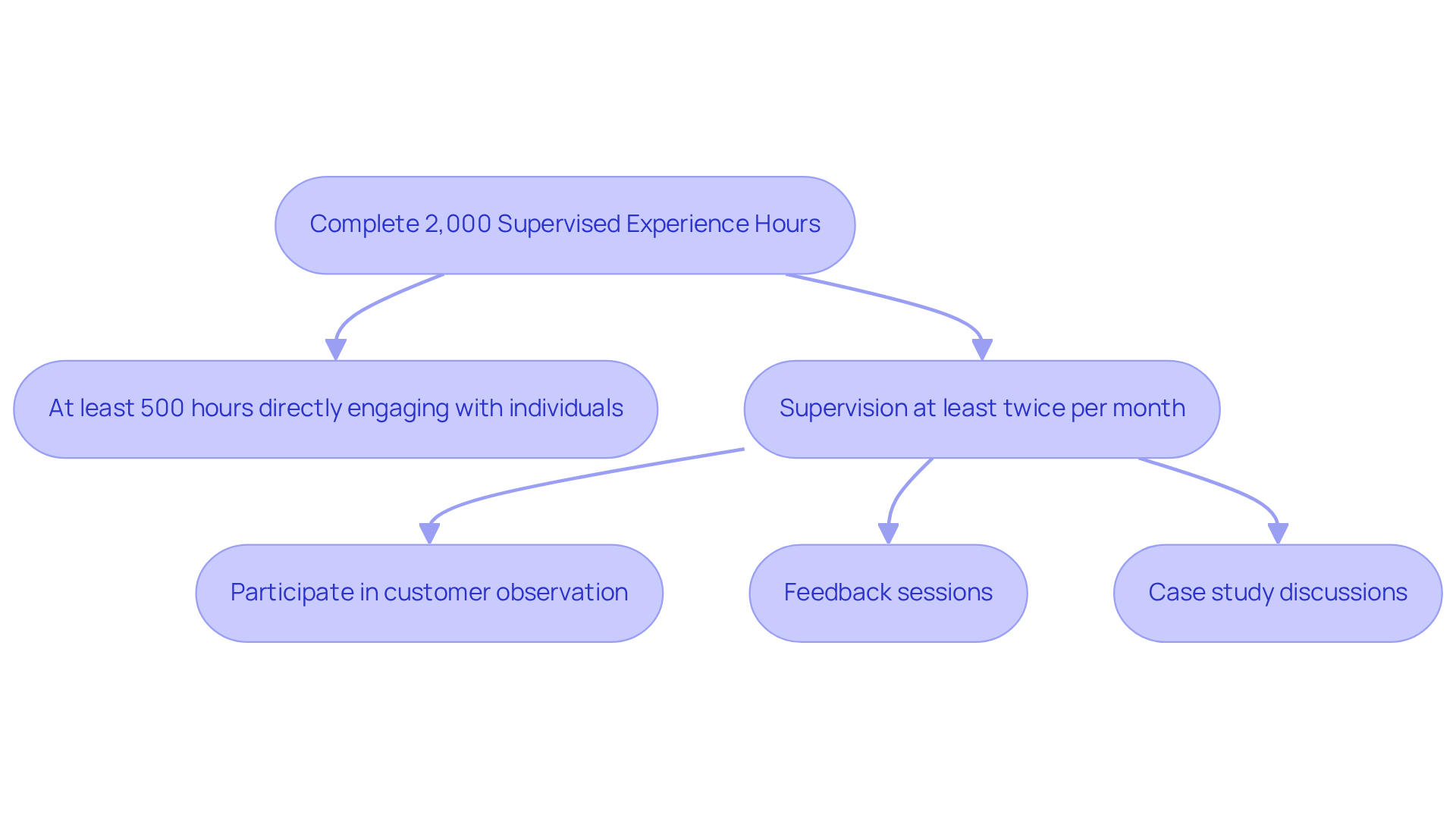
To fulfill aba therapist requirements, Certified Board Certified Behavior Analysts must complete at least every two years to maintain their certification. This ongoing education includes various formats such as workshops, conferences, and online courses, all aimed at ensuring practitioners meet the aba therapist requirements while staying informed about the latest research, techniques, and ethical standards in Applied Behavior Analysis (ABA) therapy. Notably, at least 4 of these CEUs must focus on ethics. Additionally, if providing supervision, board certified behavior analysts are required to earn 3 CEUs in supervision.
Participating in lifelong education not only expands a therapist's skill set but also helps them fulfill the aba therapist requirements, greatly improving the quality of care provided to individuals. As industry leaders emphasize, meeting aba therapist requirements is crucial for continuous professional development, adapting to evolving practices, and improving job performance. This ultimately leads to better outcomes for those served in the field.
Furthermore, 88% of respondents trust peer-reviewed journal articles the most for professional development, underscoring the importance of high-quality sources in ongoing education. To effectively plan for CEUs, behavior analysts should consider establishing a schedule for professional development activities throughout their recertification cycle.
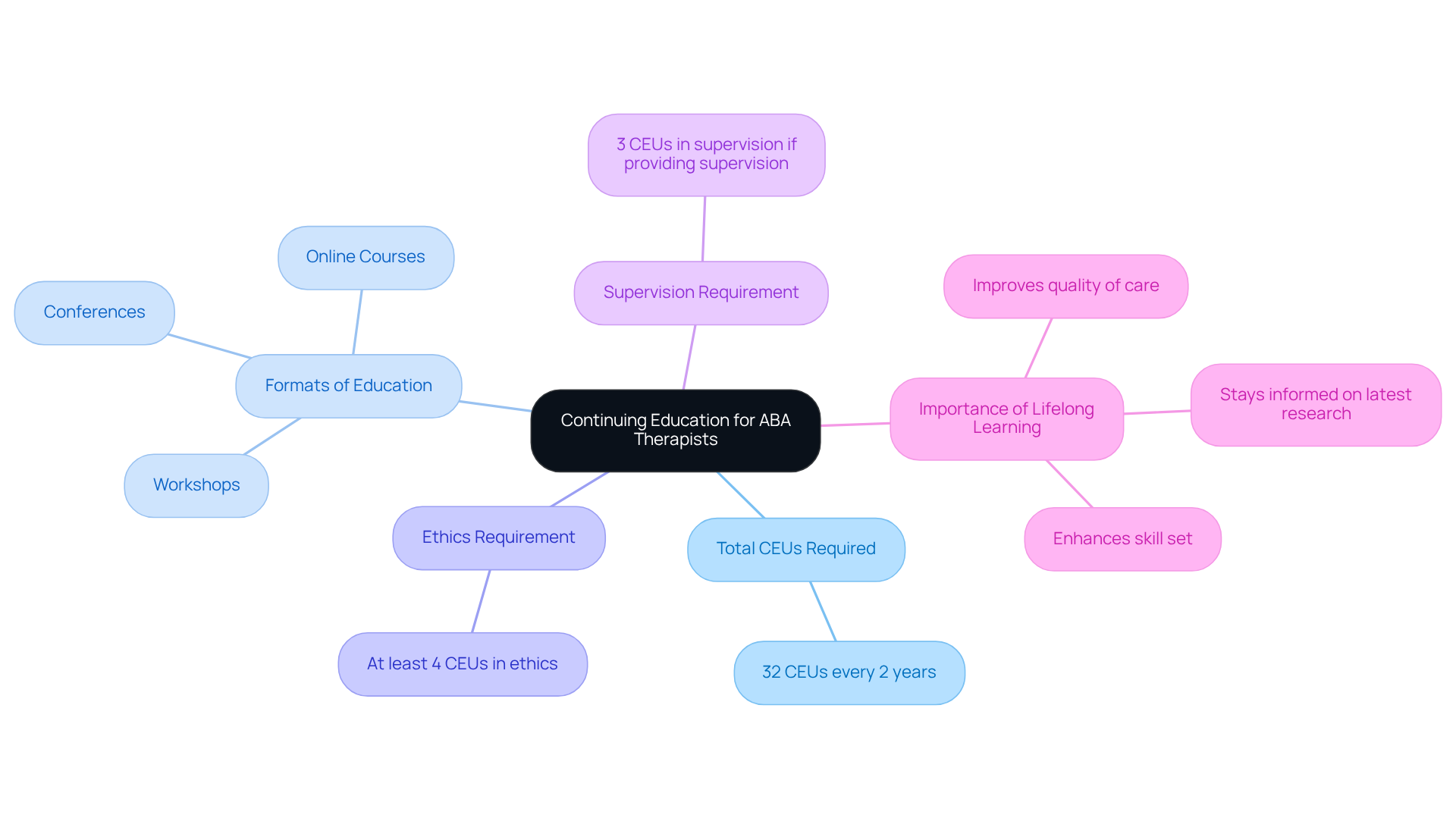
Ethical standards in ABA therapy are not merely guidelines; they are regulated by the Behavior Analyst Certification Board (BACB) and embody essential principles such as:
Behavior analysts are tasked with ensuring that their practices not only promote the well-being of clients but also uphold transparency and accountability. This commitment to is vital for fostering trust and ensuring effective therapeutic relationships. Are you prioritizing these standards in your practice? Consider the profound impact they have on your clients and the integrity of your work.
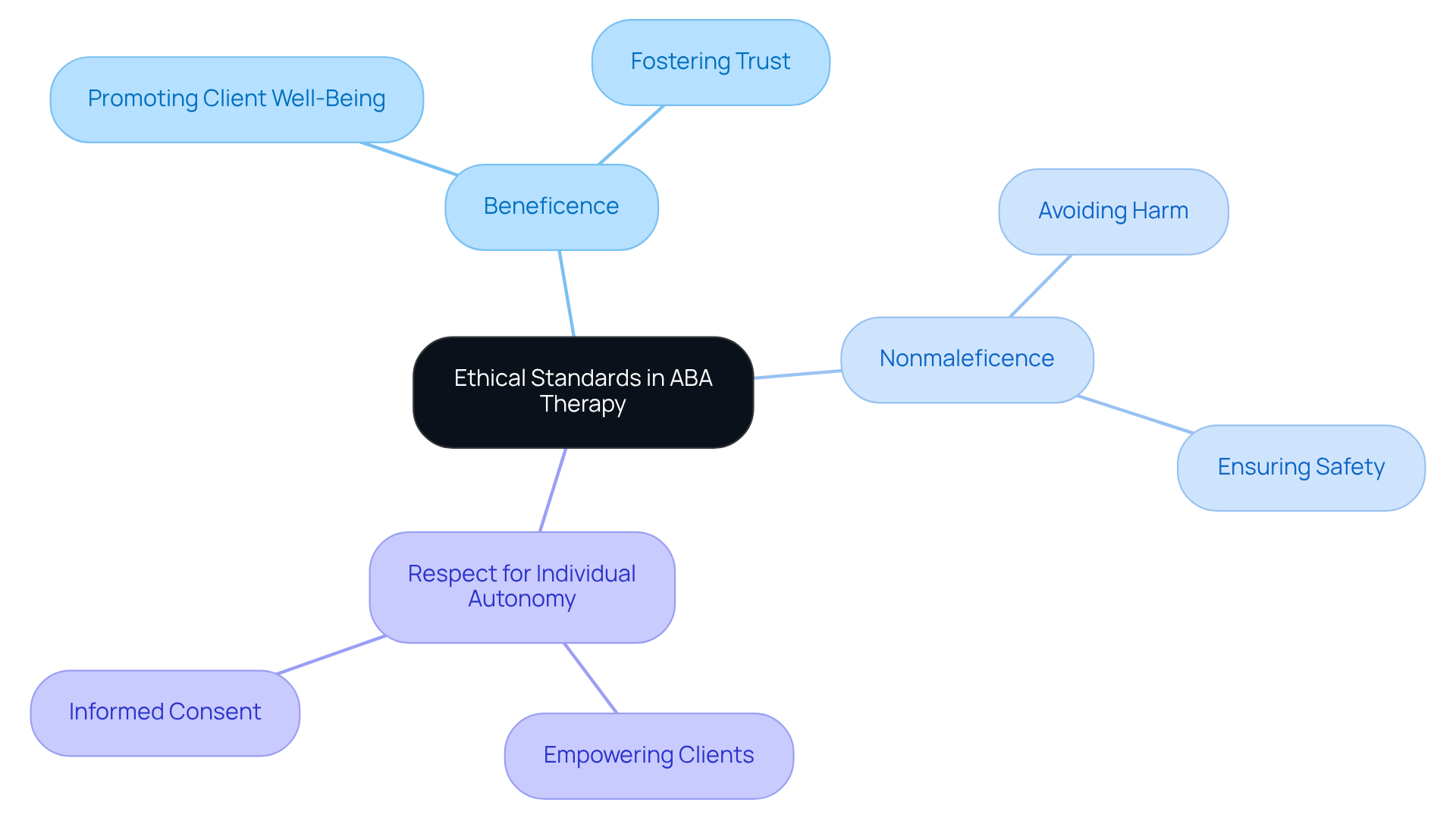
The aba therapist requirements for licensure differ significantly across states, with many jurisdictions mandating that Board Certified Behavior Analysts secure a state license in addition to their national certification. This process typically involves submitting documentation of educational qualifications, supervised experience, and successfully passing a state-specific examination. Notably, as of 2022, 36 states in the U.S. require licensure, reflecting a growing trend towards stricter regulations in the field.
Navigating these regulations is crucial for ensuring compliance and maintaining the legal ability to practice within each state. Professionals in the field emphasize the importance of understanding local laws, as failure to comply can lead to significant legal and operational challenges. As one expert noted, "By ensuring that best practices are followed, organizations can ensure a successful expansion, allowing them to continue making a positive impact in the lives of children and their families."
Real-world examples illustrate the complexities involved. For instance, South Carolina's Medicaid program mandates that all supervisory and direct therapy providers of ABA must be credentialed through the Behavioral Analyst Certification Board (BACB) to qualify for insurance reimbursement. This requirement not only enhances the quality of care but also underscores the necessity for practitioners to stay informed about the aba therapist requirements and evolving licensure laws. Additionally, Massachusetts adopted behavior analyst licensing laws in 2013, followed by Alabama in 2014, marking significant steps in the regulatory landscape.
Current trends indicate that states without licensure are actively advocating for legislation to regulate behavior analysts, highlighting the dynamic nature of the field. For example, California's Assembly Bill 1715 was introduced in 2016 to address behavior analysis issues but was later withdrawn, reflecting the challenges in legislative progress. As the landscape of ABA practice continues to evolve, professionals must remain vigilant and proactive in understanding and adapting to these local regulations to ensure their practice thrives. To stay updated, practitioners should regularly and utilize resources like the BACB for the latest information.
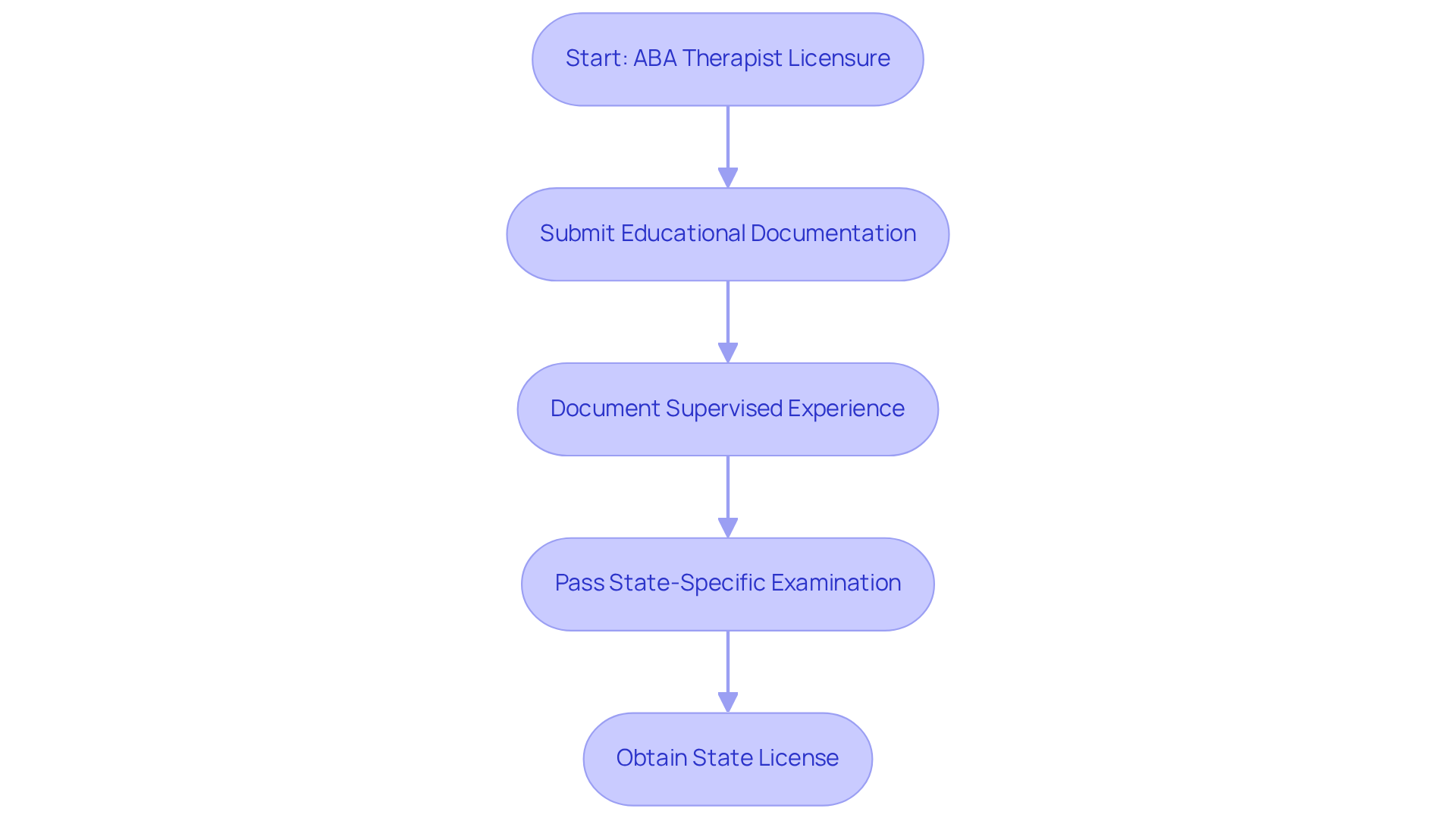
The demand for Board Certified Behavior Analysts (BCBAs) is projected to rise by 25% over the next five years, highlighting the ABA therapist requirements, including practical experience in Applied Behavior Analysis (ABA) therapy, that are essential for aspiring professionals. Internships, volunteer opportunities, and entry-level positions in clinics and schools provide invaluable hands-on practice that bridges theoretical knowledge with real-world application. These experiences not only enhance skill development but also foster professional networking, which is crucial in the field. Have you considered how interacting directly with clients can prepare you for the complexities of behavior analysis? This direct engagement ensures that future therapists are well-equipped to support individuals effectively.
Keeping updated on new opportunities is vital, as numerous accomplished behavior analysts attribute their internships to offering perspectives on interactions with individuals and treatment planning. These insights are essential for meeting ABA therapist requirements and may lead to leadership positions. Furthermore, volunteer work in community environments exposes aspiring therapists to varied needs, reinforcing the significance of adaptability and creativity in their approach.
As noted, "ABA therapy is considered the gold standard for treating autism spectrum disorder (ASD)," highlighting the necessity of being well-prepared in this competitive field. Additionally, the average salary for BCBAs is approximately $68,000 per year, underscoring the financial benefits of gaining practical experience and securing a position in this rewarding profession. To maximize your career potential, actively seek out that align with your interests and goals. These experiences can significantly influence your career trajectory in this booming market.
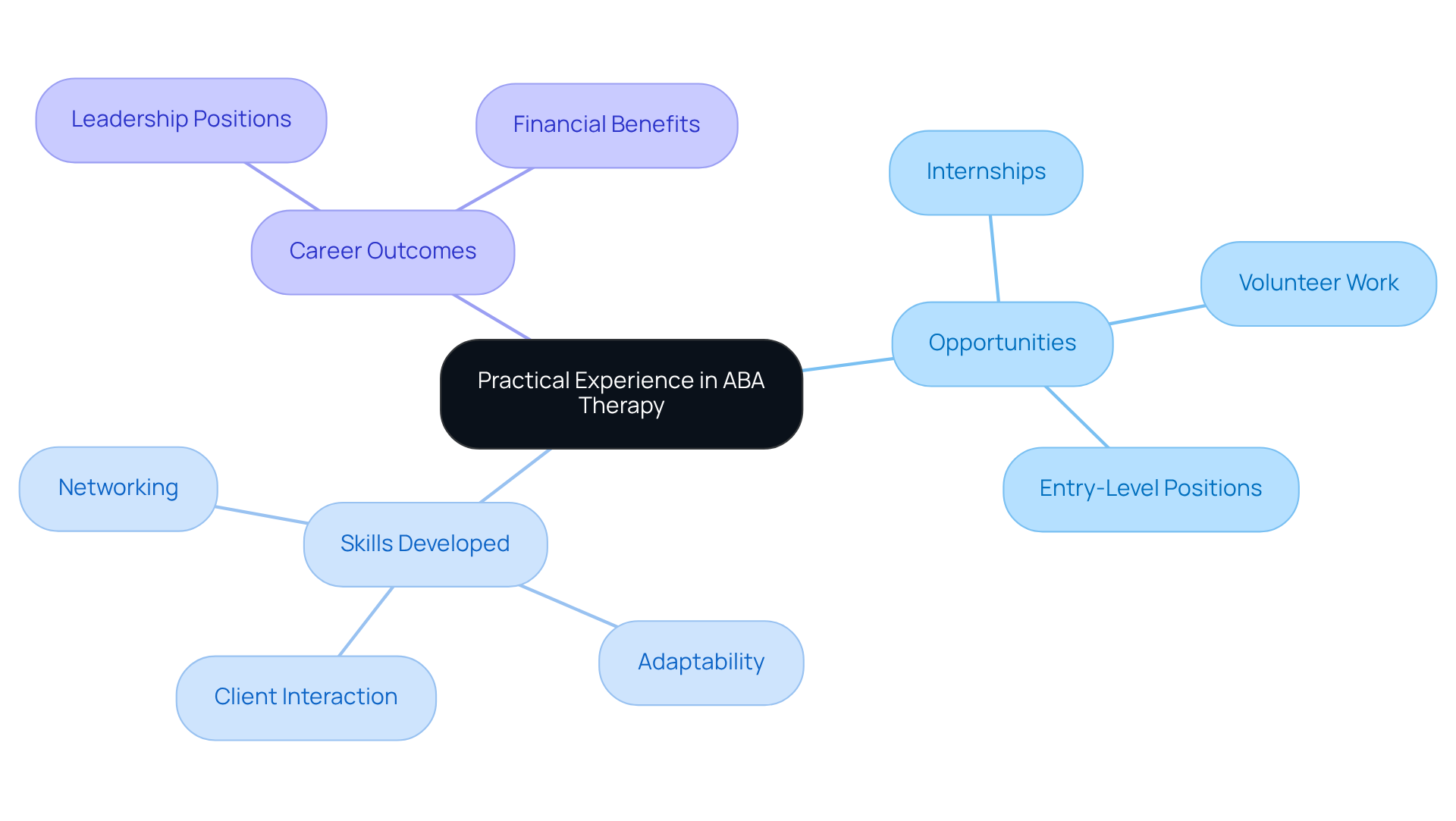
Strong communication abilities are among the key ABA therapist requirements, enabling therapists to convey complex ideas in a way that individuals and their families can easily understand. By employing active listening, empathy, and clear articulation of goals and strategies, therapists cultivate trust and collaboration.
As one BCBA noted, "Establishing trust with individuals begins with effective communication; it’s about making sure they feel heard and understood." This solid communication foundation not only strengthens the therapeutic relationship but also significantly enhances the .
For instance, BCBAs often utilize visual aids and structured feedback to ensure individuals grasp the objectives of their therapy, leading to improved engagement and outcomes.
Another BCBA remarked, "Using visual supports has transformed how the individuals I work with engage with their goals; they become active participants in their own therapy."
The capacity to adjust communication styles to meet the distinct needs of each client is vital for fulfilling ABA therapist requirements, as it empowers individuals to actively engage in their therapeutic journey, ultimately resulting in more successful interventions.
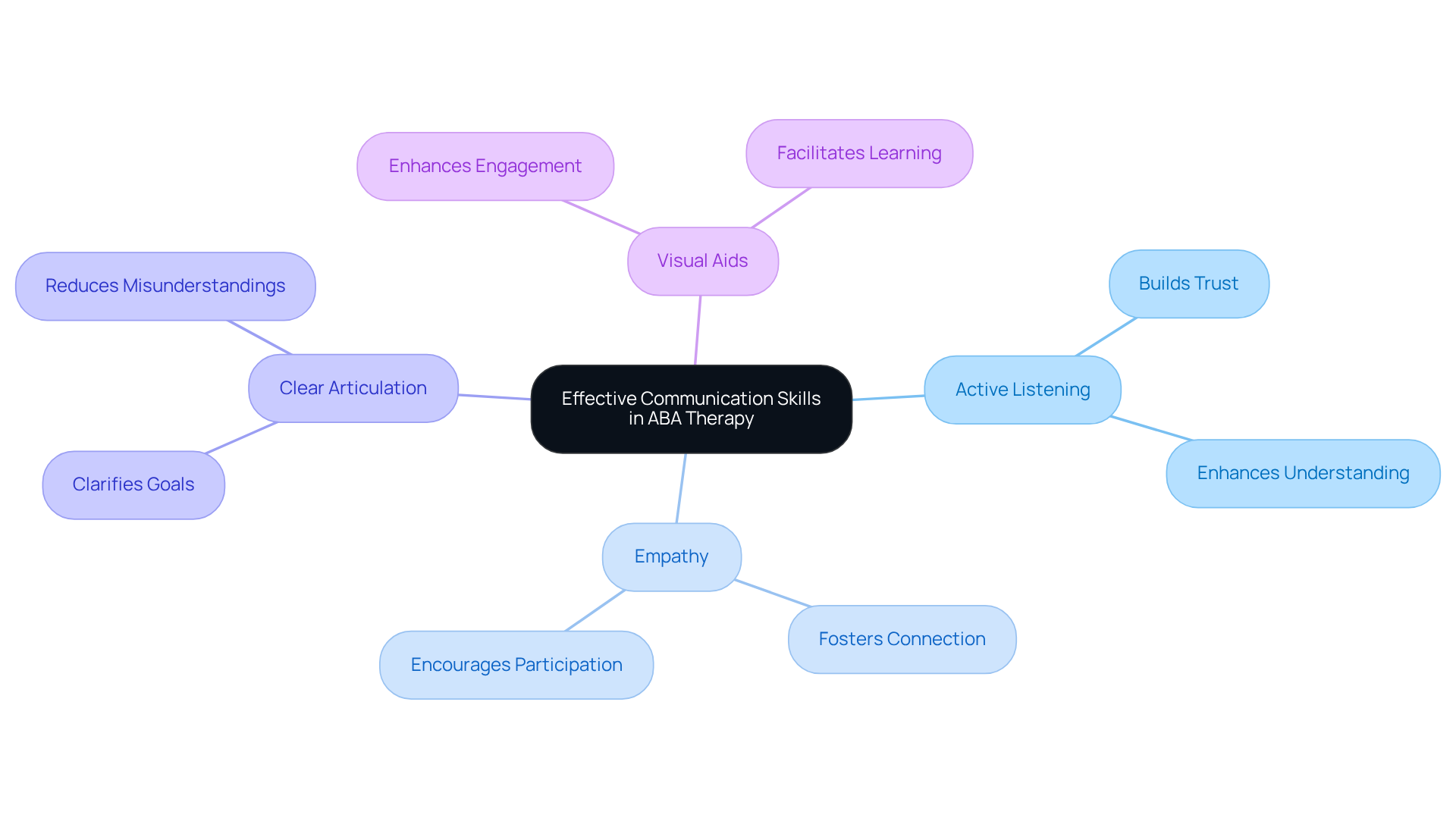
The job outlook for ABA therapists is exceptionally promising, with the Bureau of Labor Statistics projecting a remarkable growth rate of 22% for Board Certified Behavior Analysts from 2023 to 2033. This surge is largely fueled by the across educational and clinical settings.
As awareness of the effectiveness of ABA therapy continues to rise, job opportunities for ABA therapists are anticipated to expand significantly, with approximately 9,100 new job openings expected in the next decade. Have you considered the implications of this growth for your hiring needs?
The demand for BCBAs has seen a staggering increase of 5,852% in job postings from 2010 to 2021, reflecting the field's robust growth trajectory. According to industry leaders, the recognition of ABA as an evidence-based intervention is driving the need for qualified professionals to meet the ABA therapist requirements, particularly in states like California, Massachusetts, Texas, Florida, and Georgia, where demand is highest.
Now is an opportune time for aspiring professionals to enter this rewarding field by fulfilling the ABA therapist requirements. How can you ensure you attract the best talent in this expanding market? Hire ABA is your solution for effective recruitment in this thriving sector.
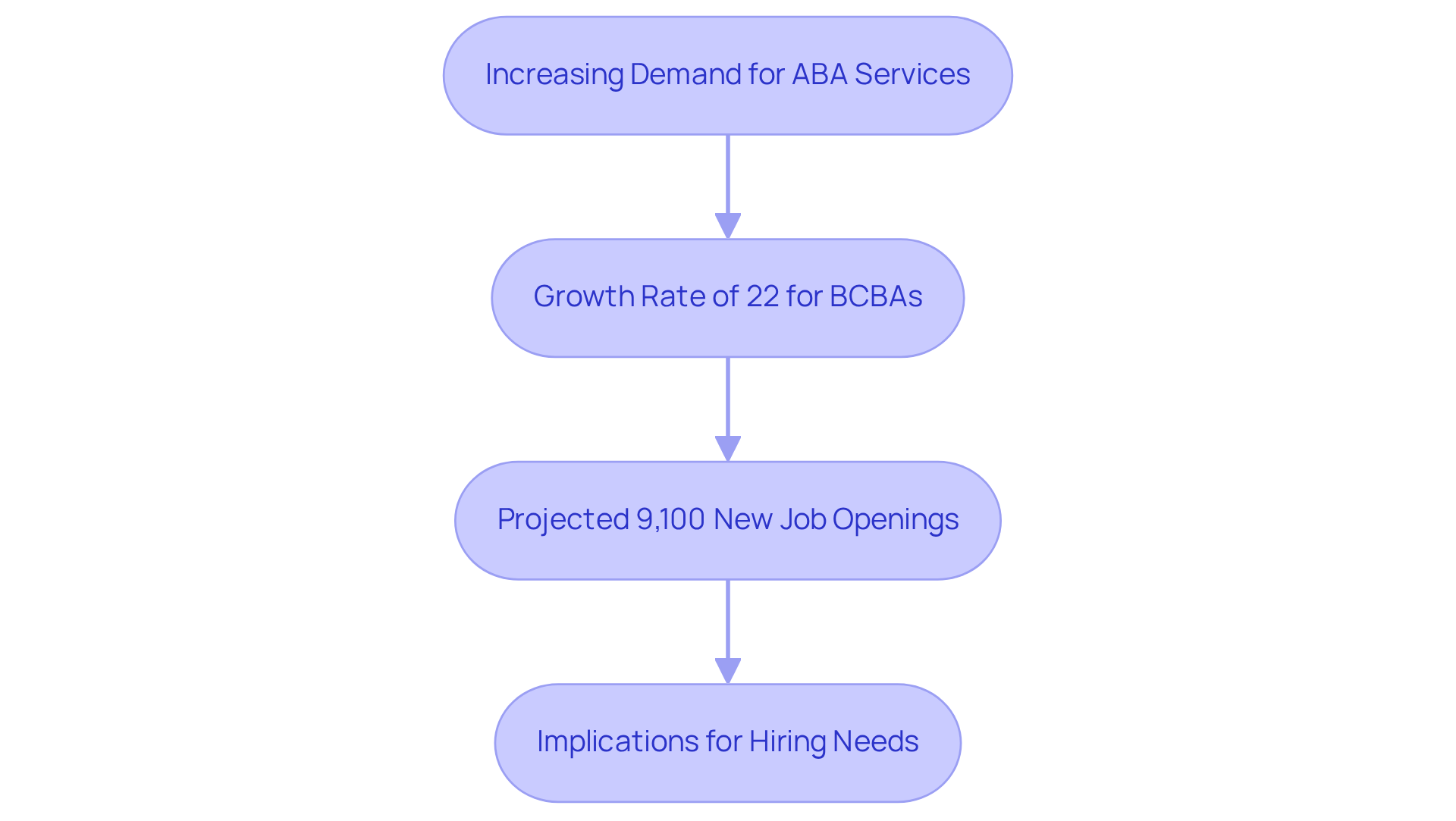
The pathway to becoming a successful ABA therapist is underscored by a series of essential requirements that not only enhance professional competence but also ensure effective service delivery. With the demand for Board Certified Behavior Analysts (BCBAs) rapidly increasing, obtaining a relevant bachelor's degree, achieving BCBA certification, and gaining practical experience are crucial steps in shaping qualified practitioners.
Key insights emphasize the importance of foundational education, supervised training, and ongoing professional development. The surge in job opportunities for BCBAs highlights the critical need for individuals in this field to be well-prepared, equipped with essential skills such as effective communication and ethical practice. As the landscape of ABA therapy evolves, so too must the strategies employed by both aspiring therapists and hiring organizations.
In light of these insights, current and future professionals must actively engage in their educational journeys while seeking practical experiences that align with their career goals. Are you facing challenges in hiring qualified talent? Utilizing specialized recruitment platforms like Hire ABA can streamline your hiring process, ensuring that organizations attract the best talent in this thriving field.
Embracing these essential requirements not only enhances individual careers but also contributes to the overall effectiveness and integrity of ABA therapy. This ultimately benefits the clients and communities served, reinforcing the importance of being prepared in a growing profession.
What is Hire ABA and how does it benefit Board Certified Behavior Analysts (BCBAs)?
Hire ABA is a specialized recruitment platform that connects BCBAs with job opportunities in the growing field of behavior analysis. It utilizes advanced algorithms and a user-friendly interface to streamline the job matching process, helping professionals secure positions that align with their skills and career goals.
What is the projected job growth for BCBAs?
The demand for BCBAs is expected to increase by 25% by 2026, with a broader job growth rate of 22% over the next decade.
How significant has the increase in job postings for behavior analysts been in recent years?
From 2010 to 2022, job postings for behavior analysts increased by 1,942%, and they are projected to triple to over 103,000 by 2024.
What educational background is required to become an ABA therapist?
A bachelor's degree in psychology, sociology, education, or a related field is required for aspiring ABA therapists. This foundational education is crucial for understanding human behavior and implementing ABA strategies effectively.
What percentage of ABA therapists hold a bachelor's degree?
Current trends indicate that 71% of ABA therapists meet the requirements by holding a bachelor's degree.
What are the key steps to achieve Board Certified Behavior Analyst (BCBA) certification?
To achieve BCBA certification, candidates must obtain a master's degree in behavior analysis or a related field, complete targeted coursework, log a specified number of supervised experience hours, and pass the BCBA examination.
Why is BCBA certification important for professionals in the field?
BCBA certification serves as a key differentiator in a competitive job market, often leading to advanced roles and increased earning potential. Certified Behavior Analysts typically experience better career advancement opportunities.
What is the first-time pass rate for the BCBA exam?
The first-time pass rate for BCBA exam takers was 54% in 2024, highlighting the challenges candidates face during the certification process.
How long does it typically take to achieve BCBA certification?
Candidates can expect to achieve BCBA certification within two to three years, depending on their educational background and the time dedicated to supervised experience.
Our expert recruitment strategies and AI-driven sourcing ensure that you receive top-notch candidates quickly, without compromising on quality. Whether you’re looking for BCBAs, Clinical Directors, or RBTs, we’ve got you covered.